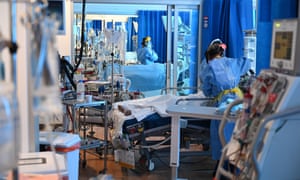Growing numbers of hospitals in England are running short of beds and having to divert patients elsewhere and cancel operations as the NHS struggles to cope with the resurgence of coronavirus, a Guardian analysis shows.
According to the NHS figures, hospitals had to tell ambulance crews to divert patients elsewhere 44 times last week – the highest number for four years.
With hospitals in London, Leicester and Northampton particularly hard hit, Chris Hopson, chief executive of NHS Providers, warned: “It already feels like we’re in the grips of a really bad winter, and there’s a very long way to go.”
The pressures are being compounded by the numbers of NHS staff who are themselves off work because of the virus, with doctors and NHS leaders saying that frontline services will come under even more intense strain in the next few weeks.
The warnings came as the UK recorded 35,383 positive cases on Thursday – the highest for a single day, with the total number of patients in hospital at more than 18,000, a rise of more almost 3,000 from the same time last week.
The growing difficulties facing the NHS emerged as:
-
Northern Ireland imposed a six-week lockdown starting on Boxing Day, that could see the closure of all non-essential retail businesses. Paramedics from the Republic are to be sent to the north to help ease pressures on ambulance crews.
-
Ministers put large swathes of the south and south-east of England into tier 3 – meaning two-thirds of the country, 38m people, are now living with the toughest restrictions.
-
The chancellor, Rishi Sunak, extended the furlough scheme by another month, until the end of April.
-
And the education secretary Gavin Williamson announced that secondary school pupils in England would go back to school after the Christmas break in a staggered way, prompting a widespread return to online lessons.
With hospital admissions rising sharply again, and restrictions being relaxed next week for the festive period, NHS bosses are fearful about whether services will be able to cope over the coming weeks.
Latest figures in England show there are now 15,465 patients in hospital with Covid – more than at any other time during the second wave that began in September. It exceeds the previous second wave peak, recorded prior to the current surge, of 14,712 patients recorded on 23 November, but is less than the record 18,974 seen on 12 April.
University College London hospital was forced to declare an “internal incident” on Tuesday. It told staff it had done so because it had “insufficient capacity now for emergency and Covid patients, with patients waiting for admission”.
Senior doctors were told to undertake extra ward rounds to identify patients who could be discharged, to free up space for those waiting for a bed.

Northampton general hospital has also cancelled some planned operations as the number of people it is treating who are seriously ill with Covid rose to 181 yesterday – 50% more than the 120 it was caring for at the height of the pandemic’s first wave in April.
It is also trying to plug gaps in its rotas because 250 staff are off either sick with the virus or isolating because someone in their household has symptoms.
In other signs of the NHS struggling to maintain normal services, Whipps Cross hospital in east London declared a critical incident last weekend after a surge in Covid arrivals and has cancelled surgeries and diverted patients to other places to help ease the pressure, while Leicester’s three hospitals have been treating more people with Covid this month than they did in the spring.
“We also face the usual winter pressures and are doing all we can to ensure we are able to maintain planned surgeries and procedures,” said Rebecca Brown, the acting chief executive of Leicester hospitals trust.
The government denied the five-day relaxation of lockdown restrictions next week was ill-advised. “In coming to the UK-wide Christmas agreement, we carefully considered scientific and clinical advice on how best to minimise the risks and reach a balanced and workable set of rules,” a spokesperson said. “During the period where restrictions have been eased, it is important that people still act responsibly, follow the regulations and minimise transmission risk.”
Dr Nick Scriven, the immediate past president of the Society for Acute Medicine, said: “We have talked for many years about an ‘eternal winter’ in the NHS and the challenges that alone brings all year round, but the actual winter is now on our doorstep amid a pandemic of the nature of Covid and no one can say with certainty just how destructive that could be.
“What we do know is that the country is in the grip of one crisis and is about to embark on another in the coming weeks and the fact that we will see a festive period with families mixing strikes fear into the hearts of clinicians on the frontline.”
Prof Christina Pagel, a member of the Independent Sage committee and director of clinical operational research at University College London, said “hospital occupancy may well exceed April’s peak within the next two weeks … many frontline NHS staff are exhausted, traumatised and demoralised”.
She added: “This will mean many more deaths to come – and this is all before the Christmas relaxation starts. It feels as if we are slowly but surely walking into a burning building on purpose, knowing it’s probably going to crash down around our heads.”
Dr Kit Yates, another member of Independent Sage, said: “Cases and admissions are rising almost everywhere. Add to that the impact of Christmas mixing and we have a recipe for a third peak which is significantly higher than the second.”